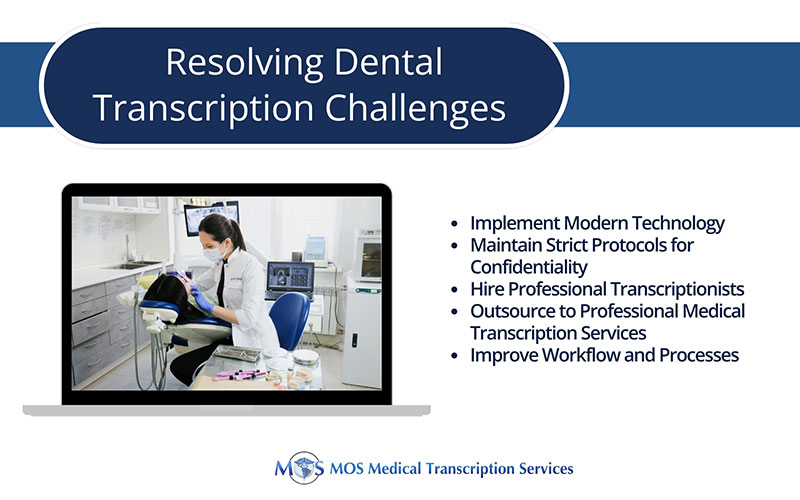
Table of Contents
Accurate dental transcription is essential for maintaining precise patient records, creating treatment plans, and ensuring seamless communication within dental practices. However, dental transcription is not without its challenges. The complexity of dental terminology, varying accents of dentists, and the need for compliance with legal and regulatory standards make it a demanding task. Additionally, the ever-growing volume of patient records requires efficient systems to keep up with the demands of a busy practice. This is where medical transcription services become important. These services offer specialized solutions to streamline the process while ensuring accuracy and compliance. With the right strategies and tools, dental practices can achieve error-free documentation, improve workflow efficiency, and enhance patient care.
Importance of Dental Transcription
Accurate dental transcription plays a critical role in the smooth functioning of dental practices and the overall quality of patient care. Precise transcription ensures that all aspects of a patient’s medical history, past and present conditions, prescribed medications, diagnostic reports, and treatment plans are recorded systematically and comprehensively. These records not only serve as a reliable reference for ongoing patient care but also streamline administrative processes such as billing and insurance claims. A well-documented transcript helps billing and coding teams navigate the complexities of insurance reimbursements more effectively, reducing delays and disputes. Furthermore, detailed dental records are instrumental in identifying warning signs that might necessitate further investigation, enabling proactive and informed treatment decisions. In addition to clinical benefits, accurate records serve a legal purpose by providing vital documentation in case of disputes or court cases. The ability to retrieve error-free, detailed patient records can protect dental professionals and ensure compliance with regulatory standards. It is all about safeguarding patient outcomes, enhancing operational effectiveness, and maintaining the integrity of your dental practice.
Challenges in Dental Transcription
- Accuracy and Error Rates: Accurate documentation is critical in dentistry, as even minor errors in patient records can lead to incorrect treatments or misdiagnoses. Mistakes often arise from poor audio quality, unclear dictation, or transcriptionists unfamiliar with dental terminology. Errors can compromise patient safety, delay treatments, and cause legal issues for dental practitioners.
- Complex Dental Terminology: Dental records contain complex and specialized terminology. The use of abbreviations, terms, and intricate anatomical references increases the risk of inaccuracies in the transcripts. Misinterpretation of these terms can lead to errors in patient records, potentially affecting treatment plans and outcomes.
- Turnaround Time: Dental practices often need documentations to be completed quickly to ensure efficient operations. Delays in turnaround times can slow down billing, coding, and patient care processes. Inefficiencies in transcription turnaround can lead to patient dissatisfaction and financial losses for the practice.
- Compliance with Legal and Regulatory Standards: Dental records contain sensitive patient information that must be kept confidential to comply with privacy regulations such as HIPAA. Ensuring data security during documentation is a critical concern. Failing to meet these standards can lead to legal liabilities. Non-compliance can result in fines, legal challenges, and operational disruptions.
- Evolving technologies: Modern dental practices rely on Electronic Health Record (EHR) systems for documentation. Integrating transcription services with these systems can be challenging, particularly when using outdated or incompatible technologies. Ineffective integration can lead to inefficiencies, errors, and delays in accessing patient records.
- High Workload and Time Constraints: Dental practitioners face the dual responsibility of providing patient care while keeping up with the medical documentation, often leading to overwhelming workloads. This is challenging for practitioners and they may rush through dictations or delay transcription tasks. This not only affects the efficiency of dental practice operations but can also impact the quality and timeliness of patient care.

Resolving the Challenges with Medical Transcription Services
- Implementing modern technology: To reduce error rates and speed up turnaround times, modern transcription services make use of cutting-edge technologies like voice recognition software and AI-powered tools along with human transcription. These solutions streamline the documentation process and guarantee accuracy by adjusting to the unique requirements of dentistry practices. Faster and more accurate documentation is possible for dental professionals by incorporating technology into transcribing procedures.
- Maintaining Strict Protocols for Confidentiality: Professional transcription providers use strict security measures in accordance with HIPAA and other regulatory standards to handle confidentiality concerns. Sensitive patient data is protected by encryption, safe data transfer techniques, and frequent audits. Dental professionals can rest easy knowing that their records are safe and secure due to these strict protocols.
- Hiring Professional Transcriptionists: Trained experts knowledgeable in dental terminology and transcribing procedures work for medical transcription firms. Expert transcriptionists minimize the possibility of mistakes by guaranteeing the correctness of intricate dental information. High-quality documentation for dental clinics is ensured by transcriptionists who stay current through ongoing training and adherence to strict regulation.
- Outsourcing to Professional Services: Outsourcing transcription of dental records to expert providers is a cost-effective solution to manage administrative workloads. Professional transcription services bring specialized expertise and advanced tools to handle documentation efficiently. By outsourcing, dental practices can focus on delivering high-quality care while ensuring their documentation needs are met by trusted professionals.
- Improving Workflow and Processes: Streamlined workflows and standardized processes enhance the efficiency of documentation. Reliable transcription services have professionals to track progress, allocate resources, and ensure timely completion of assignments. These organized approaches reduce bottlenecks and ensure seamless integration with dental practice operations, leading to better time management and operational efficiency.
By leveraging these solutions, dental practices can overcome transcription challenges, enhance documentation accuracy, and ensure compliance with industry standards. Partnering with medical transcription services is an investment in efficiency, security, and patient care.


